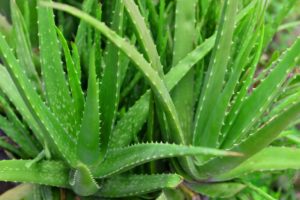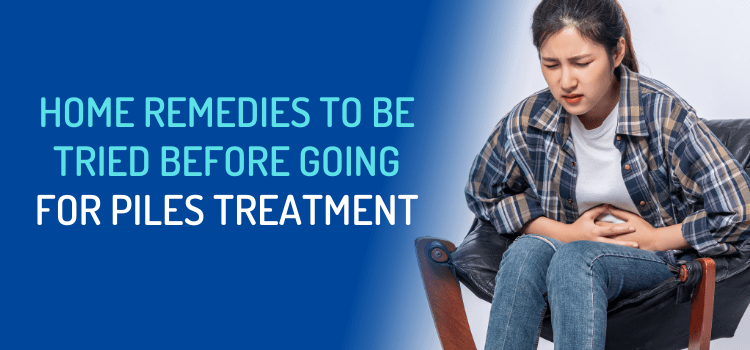
Allergies can significantly disrupt daily life, but there are several effective ways to get rid of allergies or at least reduce their impact. The first step is identifying the specific allergens through medical allergy testing, which helps tailor a personalized treatment plan. One of the most effective long-term treatments is allergy immunotherapy, such as allergy shots or sublingual tablets, which gradually desensitize the immune system to allergens. For short-term relief, antihistamines, decongestants, and nasal corticosteroids can reduce common symptoms like sneezing, runny nose, and itchy eyes. It’s also essential to reduce exposure to allergens by maintaining a clean indoor environment—regularly vacuuming with a HEPA filter, using air purifiers, and washing bedding in hot water can help remove dust mites, pet dander, and pollen. During high pollen seasons, keeping windows closed and showering after outdoor activities can prevent allergens from spreading indoors. For food allergies, strict avoidance of trigger foods and careful label reading is critical. Natural remedies such as saline nasal rinses and local honey may offer mild relief for some people, though these should not replace medically-proven treatments. Consulting an allergist ensures a comprehensive approach, combining lifestyle changes, medications, and possibly immunotherapy to effectively manage and potentially get rid of allergies over time.
Ways to get rid of blood 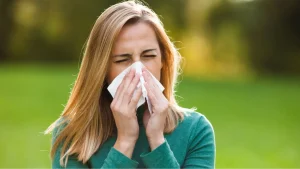 :
:
Blood allergies, often triggered by immune system reactions to certain components in the blood such as proteins or medications, can be complex and require targeted medical intervention. The first step in getting rid of blood allergies is accurate diagnosis through comprehensive allergy testing, including blood tests and skin prick tests conducted by a qualified allergist or immunologist. Once the specific allergen is identified—whether it’s a medication, food-derived protein, or environmental factor causing an immune reaction—strict avoidance is crucial. In many cases, desensitization therapies or immunotherapy may be recommended to retrain the immune system to tolerate the allergen over time. Medications such as antihistamines, corticosteroids, and epinephrine auto-injectors (for severe allergic reactions) are often prescribed to manage symptoms and prevent serious complications like anaphylaxis. For individuals with rare blood allergies like IgE-mediated reactions to blood transfusions, special protocols such as washing red blood cells before transfusion or using matched donors may be necessary. Additionally, adopting a healthy lifestyle that includes a balanced, anti-inflammatory diet, stress reduction, and regular exercise can support immune health and reduce the frequency of allergic responses. Regular follow-ups with healthcare professionals are essential to monitor progress and adjust treatment plans. By combining medical treatment, lifestyle changes, and preventive strategies, it’s possible to significantly reduce or even eliminate blood allergy symptoms over time.
Home remedies to get rid of nose allergies:
Nose allergies, also known as allergic rhinitis, can be incredibly bothersome, causing sneezing, congestion, runny nose, and itching. Fortunately, there are several home remedies that can help alleviate symptoms and provide natural relief. One of the most effective remedies is steam inhalation, which helps open nasal passages and flush out allergens. Adding a few drops of eucalyptus or peppermint oil to hot water can enhance the effect. Saline nasal rinses or a neti pot can also be highly effective for cleansing nasal passages and reducing inflammation. Another helpful remedy is honey, especially raw, local honey, which may help build tolerance to local pollen and reduce allergic reactions over time. Drinking herbal teas like ginger, chamomile, or green tea can soothe the respiratory tract and reduce histamine production. Additionally, keeping indoor air clean by using HEPA filters, regularly dusting, and avoiding exposure to pet dander or mold can significantly improve symptoms. Consuming vitamin C-rich foods like oranges, strawberries, and bell peppers may also strengthen the immune system and act as a natural antihistamine. Lastly, using turmeric, either in warm milk or as a supplement, may help reduce allergic inflammation due to its powerful anti-inflammatory properties. Incorporating these home remedies into your daily routine can provide long-term relief from nasal allergies without relying solely on medications.
Ways to get rid of foot allergies:
Foot allergies can cause redness, itching, rashes, dryness, and even blisters, making daily movement uncomfortable and irritating. Fortunately, there are several effective ways to get rid of foot allergies using natural home remedies. One of the best remedies is soaking your feet in a mixture of warm water and Epsom salt, which helps reduce inflammation, soothes itching, and eliminates allergens and toxins from the skin. Adding a few drops of tea tree oil—known for its antifungal and antibacterial properties—can further help soothe allergic reactions and prevent infections. Applying aloe vera gel directly to the affected area is another gentle yet effective way to reduce redness and provide instant cooling relief. For dry or cracked skin due to allergies, coconut oil or calendula cream can deeply moisturize and heal the skin naturally. It’s also essential to identify and avoid allergens, such as certain shoe materials, dyes, or soaps that may trigger a reaction. Wearing breathable, hypoallergenic cotton socks and avoiding synthetic fabrics can prevent flare-ups. Keeping your feet clean and dry, especially between the toes, helps reduce the risk of secondary infections. If the allergy is due to a fungal infection like athlete’s foot, applying apple cider vinegar diluted with water can help balance skin pH and fight fungus. Incorporating these natural remedies consistently can offer lasting relief from foot allergies without relying on harsh chemicals or medications.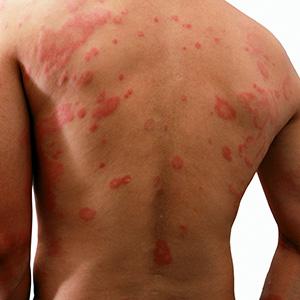
Medicine to get rid of allergic itching:
Allergic itching, also known as pruritus, can be caused by a wide range of allergens, including dust, pollen, food, insect bites, or contact with certain substances like latex or harsh chemicals. Fortunately, several over-the-counter and prescription medicines are available to relieve allergic itching effectively. One of the most commonly used medications is antihistamines, such as cetirizine, loratadine, or diphenhydramine, which work by blocking histamines—the chemicals responsible for allergic reactions. These are highly effective for both seasonal allergies and skin-related allergic itching. For more localized itching, topical corticosteroid creams like hydrocortisone can help reduce inflammation, redness, and swelling. In more severe cases, dermatologists may prescribe stronger steroid creams or oral corticosteroids like prednisone for short-term use. Calamine lotion is another soothing topical option, especially for itching caused by insect bites or skin irritants. Antihistamine creams may also be used for quick relief, but should be applied cautiously to avoid skin sensitivity. For chronic or recurring allergic itching, medications like montelukast may be prescribed to help manage long-term allergy symptoms. It’s important to identify the root cause of the allergy and avoid triggers, while using medications as recommended by a healthcare provider. Combining the right medicine with preventive care ensures faster and more effective relief from allergic itching, helping you feel comfortable and itch-free throughout the day.
Home remedies to get rid of allergic itching:
Allergic itching can be a frustrating and uncomfortable symptom of various allergies, whether caused by pollen, insect bites, certain foods, or skin irritants. Fortunately, several home remedies can help alleviate allergic itching and provide natural relief without relying on over-the-counter medications. One of the most effective treatments is cold compresses, which can help reduce inflammation and numb the itching sensation. Simply applying a cool, damp cloth to the affected area for 10-15 minutes can provide instant relief. Oatmeal baths are another soothing remedy, as oats have anti-inflammatory properties that help calm itchy skin. You can add colloidal oatmeal to your bath or make a paste and apply it directly to itchy spots. Aloe vera gel, known for its cooling and healing properties, can be applied directly to the skin to reduce itching and redness. Coconut oil is another excellent option, as it moisturizes the skin and has anti-inflammatory properties that help heal irritated skin. Apple cider vinegar, when diluted with water, can be used as a natural antiseptic to restore the skin’s pH balance and relieve itching caused by allergens. Additionally, baking soda paste, made by mixing baking soda with water, can help soothe itching, especially from insect bites or rashes. Regularly applying honey, with its natural antibacterial and anti-inflammatory benefits, can also calm irritated skin. Incorporating these home remedies into your routine can help reduce allergic itching, while moisturizing and protecting your skin from further irritation.
Medicine to get rid of allergies:
Allergies can cause a range of uncomfortable symptoms, including sneezing, itching, congestion, and watery eyes. Thankfully, several medicines are available to effectively treat allergies and provide relief. Antihistamines are among the most commonly used medications for allergic reactions, as they block histamine, the chemical responsible for triggering allergy symptoms. Over-the-counter antihistamines such as loratadine, cetirizine, and fexofenadine are non-drowsy options that help reduce sneezing, runny nose, and itching. For more severe allergy symptoms, prescription antihistamines may be recommended. Nasal corticosteroids, like fluticasone and mometasone, are highly effective for relieving nasal congestion and inflammation, especially for those suffering from seasonal allergies or allergic rhinitis. Decongestants, such as pseudoephedrine and phenylephrine, can help reduce nasal congestion by shrinking the blood vessels in the nasal passages, providing temporary relief. For skin allergies or rashes, topical corticosteroid creams like hydrocortisone can reduce inflammation and soothe itching. Leukotriene receptor antagonists, such as montelukast, are another option for treating allergies, particularly for asthma or year-round allergic rhinitis. Allergy shots (immunotherapy) may also be prescribed for those with chronic allergies, gradually desensitizing the body to allergens. If allergies cause eye irritation, antihistamine eye drops or mast cell stabilizer drops can help alleviate redness and itching. Always consult a healthcare provider before starting any allergy medications to ensure they are suitable for your specific symptoms and needs.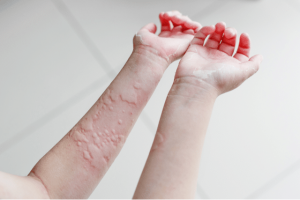
Home remedies to get rid of hand allergies:
Hand allergies can be both irritating and uncomfortable, causing symptoms such as redness, swelling, itching, and dryness. Fortunately, there are several natural home remedies that can help soothe the skin and provide relief from allergic reactions. One of the most effective treatments is cold compresses, which can reduce inflammation and numb the area, offering quick relief from itching. Simply apply a cool, damp cloth to the affected area for 10-15 minutes. Another remedy is aloe vera gel, known for its soothing and anti-inflammatory properties, which can be applied directly to the hands to reduce redness and irritation. For dry, cracked skin caused by allergies, coconut oil acts as a natural moisturizer, helping to lock in hydration and promote healing. Oatmeal baths are also highly beneficial, as oatmeal contains compounds that help calm inflamed skin and relieve itching. You can add colloidal oatmeal to a warm bath or make a paste to apply directly to your hands. Apple cider vinegar, diluted with water, can be used as a mild antiseptic to balance the skin’s pH and prevent further irritation. Baking soda paste, made by mixing baking soda with water, can also help soothe itching and reduce inflammation, especially from insect bites or allergic rashes. Honey, with its antibacterial and moisturizing properties, can be applied to the hands to help heal the skin and prevent infection. Additionally, keeping the hands clean and dry, wearing gloves to protect against allergens, and avoiding harsh chemicals or soaps can prevent future flare-ups. By incorporating these home remedies, you can effectively manage hand allergies and reduce the need for over-the-counter medications.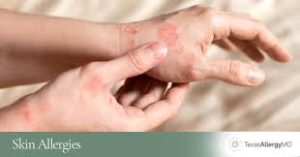
Home remedies to get rid of skin allergies:
Skin allergies can cause a variety of uncomfortable symptoms, including redness, swelling, itching, and rash. Fortunately, several home remedies can help soothe the skin and relieve these symptoms naturally. One of the most effective treatments is aloe vera gel, which is known for its cooling and anti-inflammatory properties. Applying aloe vera directly to the affected area can help reduce swelling and calm irritation. Another remedy is oatmeal, which contains compounds that help reduce inflammation and alleviate itching. You can add colloidal oatmeal to a warm bath or make a paste to apply directly to the skin for soothing relief. For dry and inflamed skin, coconut oil is a natural moisturizer that helps hydrate the skin and has anti-inflammatory benefits. Applying a thin layer of coconut oil to the affected areas can promote healing and prevent further irritation. Apple cider vinegar (ACV), diluted with water, is another popular remedy that helps restore the skin’s natural pH balance and relieves itching caused by allergic reactions. Baking soda can be used as a paste to soothe itchy skin, especially in the case of rashes or insect bites. Honey, with its antibacterial and anti-inflammatory properties, can be applied to affected areas to help prevent infection and promote skin healing. In addition to topical treatments, drinking green tea can also offer internal relief, as it contains antioxidants that help reduce inflammation and boost immune function. Keeping the skin clean and dry, avoiding known allergens, and using mild, fragrance-free skin products can also help prevent flare-ups. By incorporating these home remedies into your skincare routine, you can effectively manage and alleviate skin allergies without relying heavily on medications.



 DailyMediCure
DailyMediCure 






